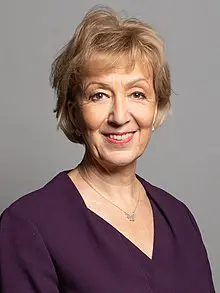The Institute of Health Visiting welcomes today’s launch of the findings from the Government’s Early Years Review – The Best Start for Life: A Vision for the 1,001 Critical Days.
The Review has been led by Early Years Health Adviser Andrea Leadsom MP and sets out a vision for best practice across the health system for the first 1,001 days of life. We are particularly encouraged by their clear statement of intent that babies and children in England will get a better start in life… with reducing inequalities.
Leading child health experts have provided evidence to the Review team (including members of the team at the Institute of Health Visiting, as well as health visitors in practice). Overwhelmingly, the evidence is clear that the care given during the first 1001 critical days has more influence on a child’s future than at any other time in their life.

Rt Hon Andrea Leadsom MP
The Chairman of the Early Years Healthy Development Review, Rt Hon Andrea Leadsom MP, said:
“When we started work on the Review, I was clear that the needs of the baby must be at the heart of everything we do. The coronavirus pandemic has put even more pressure on already struggling families and, just as we need to level up economic opportunity across the country, we need to level up the support and care for the very youngest.
“The 6 Action Areas will have a transformational impact on our society, and I am looking forward to the implementation phase of the Review where we will continue to work closely with families and the early years sector. I am confident that delivering this Vision will help millions of families to give their baby the very best start for life.”
The review highlights six action areas which are key to improving health outcomes in babies and young children:
- Seamless support for families: Local authorities will be encouraged to publish a clear Start for Life offer for parents in their area – a single publication making parents and carers aware of what support they can expect in their local area, including services they should expect to receive like health visits, and localised and specialist services, such as help to quit smoking and intensive parenting support.
- A welcoming hub for families: This builds on the Government’s commitment to champion Family Hubs, making them a place for families to access Start for Life services, such as childcare, early education and healthcare, as well as advice on jobs and training.
- The information families need when they need it: Designing digital, virtual and telephone services around the needs of the family, including digitising the Personal Child Health Record, commonly known as the ‘Red Book’. This will apply to every new birth from April 2023, bringing it forward a year.
- An empowered Start for Life workforce: Developing a modern skilled workforce to meet the changing needs of families with babies. There will also be work to attract people into health visiting and ensure that health visitors are developed and supported.
- Continually improving the Start for Life offer: Health services for families and babies must improve data, evaluation, and outcomes to ensure it is meeting a family’s needs. Work will continue across the system to hold local services to account, including through proportionate inspections, giving parents and carers confidence and assurance services are working in their area.
- Leadership for change: Work will begin to encourage local areas to nominate a leader and to ensure the delivery of the review is overseen at a national level.
Dr Cheryll Adams CBE, Founding Director iHV, commented:
“I am thrilled to see the launch of this very timely and important Review, and have been honoured to be an advisor to it. Implementation of the Review’s Action Areas will offer every family greatly improved access to a range of sources of support, as and when they need them. By being baby centric, it will also help to ensure that every baby can have access to the Best Start for Life.”
Alison Morton, Acting Executive Director iHV, said:
“I welcome the clear commitment within this review to reduce inequalities and ensure that every baby achieves their full potential – this is an ambition shared by health visitors and lies at the core of our profession. I thank Andrea Leadsom MP and her team for setting out this important first step that provides a solid foundation on which to build the strategy and plan, with much-needed investment, that will be required to turn these ambitions into a reality. There is no time to waste, against a backdrop of increasing vulnerability facing many families, I look forward to working with the Review Team on the implementation phase.”


